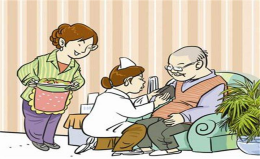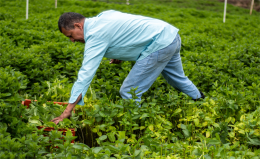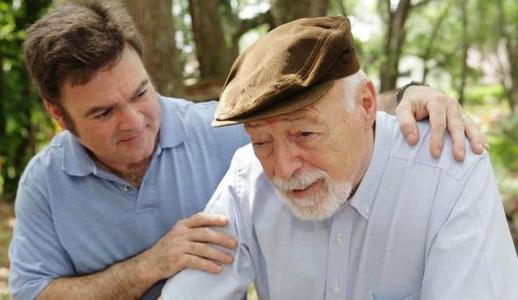How Does China Plan to Cope with an Aging Population? Let's Listen to the Special Press Conference of the National Health Commission
By the end of 2021, 1.03 billion people were covered by basic old-age insurance and 1.36 billion by basic medical insurance, with the participation rate stable at over 95 percent and universal medical insurance basically realized. By the end of 2021, China had a total of 6,492 full-licensed medical and nursing institutions, with a total of 1.75 million beds, and nearly 79,000 medical and nursing facilities signed contracts. More than 40,000 education and learning centers for senior citizens have been set up at the grassroots level...
"Actively responding to the aging population bears on the overall development of the country and the well-being of hundreds of millions of people." The National Health Commission recently held a press conference on the progress and achievements of aging work since the 18th National Congress of the Communist Party of China. Wang Haidong, director of the NHC's Department of aging health, said at the conference that over the past 10 years, the top-level design of the country's aging work has been strengthened, the multi-tiered social security system has been improved, the construction of the old-age service system has been strengthened, and the level of health management and service for the elderly has been improved.
Our aging population presents a "large number, fast speed, big difference and heavy task"
"Aging population is a basic national condition for a long time to come. At present, our aging population presents a large number, fast speed, big difference and heavy task." Wang Haidong introduced.
By the end of 2021, there were 267 million people aged 60 or above, accounting for 18.9 percent of the total population. The number of elderly people aged 65 or above reached over 200 million, accounting for 14.2 percent of the total population. The aging degree of Chinese population is further deepened, the labor force population is further reduced, and the problem of population structure is prominent. It is estimated that during the "14th Five-Year Plan" period, the total number of elderly people aged 60 and above will exceed 300 million, accounting for more than 20%, entering the stage of moderate aging. By 2035, the elderly population aged 60 or above will exceed 400 million, accounting for more than 30 percent of the total population and entering the stage of severe aging.
Wang said the country's aging population also shows differences between urban and rural areas. Specifically, there are more elderly people in urban areas than in rural areas, but the degree of aging in rural areas is higher than that in urban areas. According to 2020 data, there are 10 provinces in China where the population aged 60 or above accounts for more than 20 percent of the total population under their jurisdiction, mainly in Northeast China, Sichuan and Chongqing.
"Every family has old people, everyone will be old, the elderly are the most concerned about health issues, healthy aging is to deal with the population aging of the lowest cost, the best effective means and way." Wang said that the NHC has been committed to promoting healthy aging in recent years. It has issued a policy document on the establishment and improvement of a health service system for the elderly, specifying the need to establish and improve a comprehensive and continuous health service system for the elderly covering both urban and rural areas, including health education, prevention and care, disease diagnosis and treatment, rehabilitation nursing, long-term care and hospice care. For example, it is the first time that the training of geriatric medical professionals has been included in the central government transfer payment program. The national aging health Information Management system has also been put into operation.
"In the next step, the NHC will continue to do a good job in elderly health prevention and care, medical services, health care and other work. In particular, we will carry out four major actions for elderly oral health, elderly nutrition improvement, elderly dementia prevention and treatment and elderly psychological care. The purpose is to improve the elderly's active health ability, improve their health literacy and health level. Let the elderly get sick less, get sick later and avoid serious diseases." Wang Haidong stressed.
The development of elderly care services will focus on home-based communities
With the rapid development of aging population, the construction of old-age service system is increasingly important and urgent.
"The elderly care service system is one of the three systems to implement the national strategy of actively responding to the aging population, focusing on the problem of providing for the elderly." Li Yongxin, deputy director of the Department of Elderly care Services of the Ministry of Civil Affairs, said the ministry has done solid work in improving the policy system, strengthening the supply of elderly care services and improving the quality of elderly care services. We urged the Standing Committee of the National People's Congress to revise the Law on the Protection of the Rights and Interests of the elderly several times. China has fully opened up the market for elderly care services, and introduced preferential policies such as land supply, preferential taxes and fees, and fiscal subsidies. From 2012 to 2021, the central government has invested a total of 35.9 billion yuan to support the construction of elderly care facilities. Up to now, community services for elderly care have basically covered urban communities and more than half of rural communities. A four-year national campaign has been launched to improve the service quality of nursing homes, and 422,000 hidden dangers have been rectified.
In recent years, "9073" pension model has become the main model carried out in our country. That is, 90% of the elderly care based on their community, 7% provide for the aged in their community, and 3% provide for the aged in institutions. Among them, homes and communities are popular among the elderly. Zhang Yan, deputy director of the Ministry of Housing and Urban-Rural Development's building energy conservation and science and technology department, said that the Ministry of Housing and Urban-Rural Development has taken multiple measures to promote the construction of community elderly care service facilities, to provide elderly people with convenient services at their doorsteps. It has issued a number of standards and norms, such as the Code for Planning Urban Facilities for the Elderly, carried out research on basic public services such as community elderly care, carried out urban physical examinations in 59 cities, and accelerated the construction of facilities for elderly care services.
In addition, the Ministry of Housing and Urban-Rural Development, together with the China Disabled Persons' Federation, issued the Administrative Measures for Building National Barrier-free Demonstration Cities (counties) to guide local governments to continuously improve the level of barrier-free environment construction in a step-by-step manner, and to clarify the requirements for barrier-free access facilities by revising the Code for Barrier-Free Design and other documents. The construction and renovation of barrier-free facilities and facilities for the aged have been carried out in conjunction with the renovation of old urban communities.
Further progress was made in integrating medical and nursing care
How to realize the combination of medical and nursing care is also the most strong demand of the elderly population for a healthy life. In recent years, the National Health Commission and relevant departments have been promoting the integration of medical and nursing care to meet the diverse needs of the elderly at various levels, and positive results have been achieved, Wang said.
First of all, policies and measures have been improved. The NHC has issued the Guiding Opinions on Further Promoting the Development of Integrated Medical and Nursing Care, and formulated three standards and norms, namely, Management Guide for Integrated Medical and Nursing Care Institutions, Service Guide for Medical and Nursing Care Institutions, and Service Guide for Contracted Medical and Nursing Care Cooperation. Secondly, the supply of services has increased significantly. By the end of 2021, the number of medical and nursing care contracts nationwide was 6.6 times that of 2017. The number of combined institutions with two certificates increased by 76.7% compared with 2017. Third, the quality of services has been effectively improved, and the combination of medical and nursing care has been included in the national quality work assessment of provincial governments.
"In the next step, we will deepen the joint construction and sharing of medical and nursing resources, increase the supply of integrated medical and nursing services in home communities, and improve the quality of integrated medical and nursing services. We will implement the standards and norms for the integration of medical and nursing services, carry out continuing education for practitioners, and implement demonstration projects for the integration of medical and nursing services, so that the elderly can obtain high-quality, efficient and convenient integrated medical and nursing services." Wang Haidong said.
Strengthen protection of the legitimate rights and interests of the elderly
Pension fraud, is also a high social concern in recent years.
"Cracking down on pension fraud is not only a matter for public prosecutors and judicial departments, but also requires the combined efforts of all departments. In April this year, approved by the CPC Central Committee, led by the Ping An China Construction Coordination Group, organized a nationwide crackdown on pension fraud. The NHC, as one of 12 departments that have jointly launched a special campaign, is mainly responsible for cracking down on elderly care fraud in the health sector. The Commission has carried out extensive and in-depth publicity of anti-fraud and anti-fraud policies and popular science knowledge, strengthened the verification and rectification of reporting clues, carried out special inspection of private hospitals, and included the random inspection of medical institutions in elderly care institutions into the 2022 National random supervision and random inspection plan of the National Health Commission. And jointly with the Ministry of Civil Affairs, the State Administration of Traditional Chinese Medicine and other departments to issue a notice to guide local authorities to focus on medical violations in elderly care institutions." Wang said the NHC will continue to take special actions to protect the legitimate rights and interests of the elderly.
"In accordance with the deployment of the special action, the Ministry of Civil Affairs is responsible for regulating the potential fraud problems in the field of elderly care services, and guiding local civil affairs departments to promote the bottom of the inventory of hidden dangers. Good progress has been made." Li Yongxin added that the civil affairs department mainly carried out three aspects of work: first, comprehensive publicity and launch; By the end of August this year, more than 270,000 institutions and sites had been investigated, and 950 potential risks had been identified. Third, focus on cracking down. According to the "red, orange and yellow" level of potential risks, institutions and places with potential problems will be dealt with according to the law. In the next step, the civil affairs department will complete the tasks of the special action with high quality according to the unified deployment, and protect the "pension money" of the common people, so that the majority of the elderly can enjoy a happy old age.
"Going forward, we will continue to earnestly implement the national strategy of actively responding to population aging, promote healthy aging, and strive to find a path of responding to population aging with Chinese characteristics." Wang Haidong finally said.






